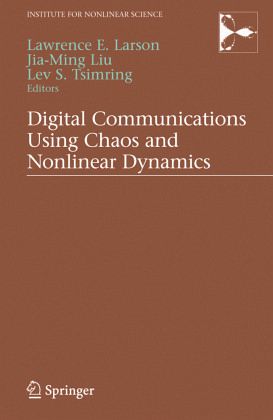
Digital Communications Using Chaos and Nonlinear Dynamics
Versandkostenfrei!
Versandfertig in 6-10 Tagen
113,99 €
inkl. MwSt.

PAYBACK Punkte
57 °P sammeln!
This book provides a summary of the research conducted at UCLA, Stanford University, and UCSD over the last ?ve years in the area of nonlinear dyn- ics and chaos as applied to digital communications. At ?rst blush, the term "chaotic communications" seems like an oxymoron; how could something as precise and deterministic as digital communications be chaotic? But as this book will demonstrate, the application of chaos and nonlinear dynamicstocommunicationsprovidesmanypromisingnewdirectionsinareas of coding, nonlinear optical communications, and ultra-wideband commu- cations. The eleven chapters ...
This book provides a summary of the research conducted at UCLA, Stanford University, and UCSD over the last ?ve years in the area of nonlinear dyn- ics and chaos as applied to digital communications. At ?rst blush, the term "chaotic communications" seems like an oxymoron; how could something as precise and deterministic as digital communications be chaotic? But as this book will demonstrate, the application of chaos and nonlinear dynamicstocommunicationsprovidesmanypromisingnewdirectionsinareas of coding, nonlinear optical communications, and ultra-wideband commu- cations. The eleven chapters of the book summarize many of the promising new approaches that have been developed, and point the way to new research directions in this ?eld. Digital communications techniques have been continuously developed and re?ned for the past ?fty years to the point where today they form the heart of a multi-hundred billion dollar per year industry employing hundreds of thousands of people on a worldwide basis. There is a continuing need for transmission and reception of digital signals at higher and higher data rates. There are a variety of physical limits that place an upper limit on these data rates, and so the question naturally arises: are there alternative communi- tion techniques that can overcome some of these limitations? Most digital communications today is carried out using electronic devices that are essentially "linear," and linear system theory has been used to c- tinually re?ne their performance. In many cases, inherently nonlinear devices are linearized in order to achieve a certain level of linear system performance.














